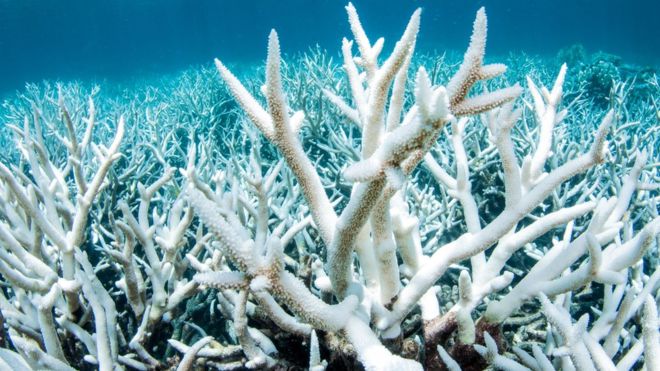Australia: Great Barrier Reef Survival Relies on Halting Warming, Study Warns
ENVIRONMENT, 20 Mar 2017
BBC News – TRANSCEND Media Service

The Great Barrier Reef is experiencing its worst bleaching on record.
Image copyright Brett Monroe Garner
Australia’s Great Barrier Reef can be saved only if urgent steps are taken to reduce global warming, new research has warned.
16 Mar 2017 – Attempting to stop coral bleaching through any other method will not be sufficient, according to scientists.
The research, published in the journal Nature, said bleaching events should no longer be studied individually, but as threats to the reef’s survival.
The bleaching – or loss of algae – in 2016 was the worst on record.
“Climate change is the single greatest threat to the Great Barrier Reef,” said co-author Prof Morgan Pratchett, from Queensland’s James Cook University.
“It all comes down to what the governments in Australia and around the world do in terms of mitigating further rises in temperatures.”
httpv://www.youtube.com/watch?v=iICwB0Nzxc4
Mass coral bleaching
- Coral bleaching is caused by rising water temperatures resulting from two natural warm currents.
- It is exacerbated by man-made climate change, as the oceans are absorbing about 93% of the increase in the Earth’s heat.
- Bleaching happens when corals under stress drive out the algae known as zooxanthellae that give them colour.
- If normal conditions return, the corals can recover, but it can take decades, and if the stress continues the corals can die.
Lead author Prof Terry Hughes warned bleaching events had become “the new normal”.
Last week, he said an aerial survey had shown evidence of mass bleaching in consecutive summers for the first time.
The scale of the damage will be examined in the next three weeks by the National Coral Bleaching Taskforce, a collaboration of scientists and reef managers.
Prof Pratchett said he remained optimistic the reef could recover, but the “window of opportunity” to curb emissions was closing.
“It’s the number one thing we need to think about now to save the reef,” he told the BBC.
Improving fishing practices or water quality would not be enough, he said.
httpv://www.youtube.com/watch?v=8GQMhRqMtj4
The reef – a vast collection of thousands of smaller coral reefs stretching from the northern tip of Queensland to the state’s southern city of Bundaberg – was given World Heritage status in 1981.
The UN says it is the “most biodiverse” of all the World Heritage sites, and of “enormous scientific and intrinsic importance”.
__________________________________
Australian summer broke 205 records
Can super coral save the Great Barrier Reef?
Is the Great Barrier Reef coming to the end of its life?
Great Barrier Reef suffered worst bleaching on record in 2016, report finds – 28 November 2016
Sea snails could save Great Barrier Reef from starfish – 18 August 2016
Just 7% of Australia’s Great Barrier Reef escapes bleaching – 20 April 2016
DISCLAIMER: The statements, views and opinions expressed in pieces republished here are solely those of the authors and do not necessarily represent those of TMS. In accordance with title 17 U.S.C. section 107, this material is distributed without profit to those who have expressed a prior interest in receiving the included information for research and educational purposes. TMS has no affiliation whatsoever with the originator of this article nor is TMS endorsed or sponsored by the originator. “GO TO ORIGINAL” links are provided as a convenience to our readers and allow for verification of authenticity. However, as originating pages are often updated by their originating host sites, the versions posted may not match the versions our readers view when clicking the “GO TO ORIGINAL” links. This site contains copyrighted material the use of which has not always been specifically authorized by the copyright owner. We are making such material available in our efforts to advance understanding of environmental, political, human rights, economic, democracy, scientific, and social justice issues, etc. We believe this constitutes a ‘fair use’ of any such copyrighted material as provided for in section 107 of the US Copyright Law. In accordance with Title 17 U.S.C. Section 107, the material on this site is distributed without profit to those who have expressed a prior interest in receiving the included information for research and educational purposes. For more information go to: http://www.law.cornell.edu/uscode/17/107.shtml. If you wish to use copyrighted material from this site for purposes of your own that go beyond ‘fair use’, you must obtain permission from the copyright owner.